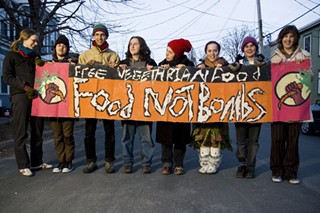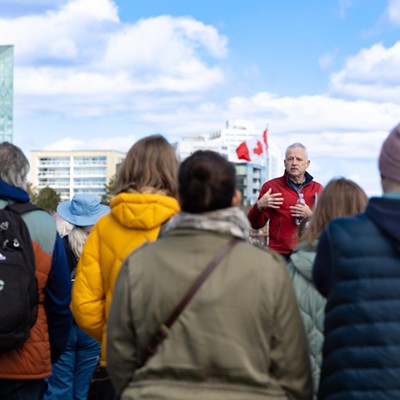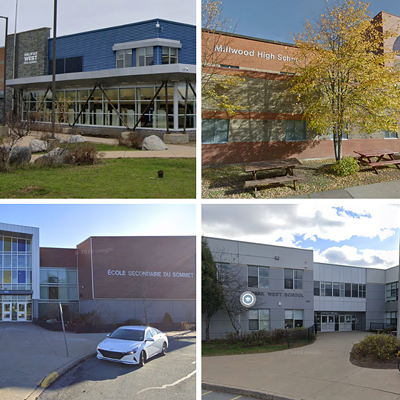There’s going to be a big Food not Bombs party this Sunday afternoon in front of the North Branch Library. Bigger than usual, that is. Food Not Bombs has rocked Gottingen Street every Sunday afternoon (and Spring Garden Road every Wednesday evening) for 10 years, serving free, delicious organic and vegetarian food to the public. If you’ve been missing out, now’s your chance to make up on lost time.
There have been a lot of dedicated people keeping Food Not Bombs alive over the years, and Sonia Edworthy is one of them. Edworthy has been involved in FNB since 1996: She began volunteering while she was a 15-year-old high-school student in Calgary. Edworthy is a fountain of knowledge about the grassroots organization and an expert on the politics of FNB. She explains some of the initial attraction to the organization that has come to be such a big part of her life. “It was really a gateway into political thought and activism for me. I think that’s how it functions for a lot of people. It’s a really accessible and fundamental activity. It’s not a charity model, it’s based on an activist model of challenging military spending by practical means. It’s not about handouts or marginalizing people who are hungry, it’s about the universal right to access food, whether you are rich, poor, young, old, whatever.”
Food Not Bombs began in Boston in the 1980s as an anti-nuclear movement, a way to react against the Cold War. It was a direct response to military spending and social cutbacks. Sharing food was a tool of protest and, at the same time, the organization was able to feed people who just wanted something to eat. This idea quickly spread through the rest of the US and Canada, mainly via youth-driven political and punk movements, until a branch began in Halifax in 1997.
For a few years before that, there had been servings of free food provided by a group called Free Food, or the Unidentified Food Organization (UFO for short), headed by artists and activists such as Helen Hill, Paul Gailiunas, Becka Barker and more. The group organized public potluck dinners around the idea of a “really playful and fun unity-based take on activism,” says Edworthy, and didn’t really focus on politics. Instead, the UFO just focused on having a good time. In ’97, the UFO joined forces with the fledgling Halifax FNB group and the current incarnation began. More politically driven than the UFO, the four tenets of FNB are veganism, non-violence, consensus-based decision-making and recycling food and the wastes of capitalism.
“It is different because it’s in public, that’s a mandate of FNB. It’s been challenged over the years because it’s slightly impractical, because we serve outside all year round, that’s because it’s a public event that exposes the fact that food is an issue and makes that connection between military spending and government spending on social programs,” Edworthy says. “That’s something that should be on the street and visible and not hidden away in a church basement.”
Aside from the nutritional and political benefits of these bi-weekly meetings, friendship and community building are also some of the biggest rewards of FNB. Caleb Latreille, who has been involved with all aspects of FNB in Halifax for seven years (and is a bit of a connoisseur, having attended FNB in 12 different cities), says he has met most of his social circle while involved with the group and continues to meet new friends because of it. The FNB meetings themselves are like friendly gatherings: Pals circulate, catch up with each other’s news and joke around over containers of yummy salads, curries and soups.
“I hesitate to say it’s like a family, because that’s corny, totally corny, but it’s something that’s happened in my life every week for the last seven years,” Latreille says. “There’s the routine of that, that I find really easy to do. It helps me sustain myself. I know I can just count on the fact that at Sunday at one o’clock I’m going to be here. It’s kind of weird, because it’s kind of like church in some ways. But it’s based around sharing food and radical politics.” Edworthy echoes the sentiment, “When I moved to Halifax in ’99, FNB was one of the first communities that I felt a part of. It’s where I met all my friends. I was really passionate about vegetarianism and interested in learning about politics and radical movements. It’s a point of reference and a starting point for people.”
Because of the fact that most participants in the group live in the north end, the Halifax North Branch Library meeting is focused more directly on the neighbourhood, while the Spring Garden Library meeting is more about placing the politics of the group in the public eye (it’s downtown, at a time when most commuters are leaving work for the day).
“The north end is an interesting space for the meeting of different cultures and communities,” Edworthy says. “It can be really tense and have a lot of conflict, but it can also have a lot of synergy. The people who come to FNB are not longtime residents of the community. It’s right by Uniacke Square and the residents don’t necessarily participate, but there are quite a few people who come and take vegetables and groceries from leftover stuff that we didn’t cook. People know that’s there and can take advantage of it.”
One of the main differences between the Halifax chapter of Food Not Bombs and other cities is that Halifax servings always have the special indulgence of all-organic food. Because of weekly pick-ups from the Farmers’ Market, the volunteers get to learn about where their food comes from and develop a meaningful relationship regarding food production and distribution. “No other FNBs have anything that comes close to that. serve a good pot of soup and a ton of dumpstered Superstore cakes, which are fun, but it’s not challenging any mentalities,” says Latreille.
“There is a real connection with the farmers and organic food is appreciated and respected. The farmers spend so much time, energy and love on their food and to have it be wasted is just heartbreaking,” says Edworthy. “They know Food Not Bombs is going to cook it and make really delicious food to serve to the public. They can count on that and it means a lot to them.”
The Sunday anniversary celebration will have special guest speakers talking about FNB history and issues surrounding food security and poverty. There will be a representative from the Halifax Coalition Against Poverty and some longtime FNB participants will share some stories about what the organization means to them. The Sunday celebration is a good chance to get involved, meet some people and attend an awesome free party. New volunteers are important and ensure that Food Not Bombs will keep making a difference in Halifax. “The most exciting thing is that it’s sustainable as a collective that can keep going,” Latreille says. “I love Food Not Bombs, it’s my favourite thing in the world.”
This Sunday’s celebration is the same time as the regular Sunday afternoon Food Not Bombs meeting, 1pm in front of the North Branch Library. There will be cake and food, but people are encouraged to bring anything festive and a potluck dish. The regular Wednesday serving is held every week at 5pm in front of the Spring Garden Library.












